
Carlos Humberto Santana Barragán is an American guitarist who rose to fame in the late 1960s and early 1970s with his band Santana, which pioneered a fusion of rock and roll and Latin American jazz. Its sound featured his melodic, blues-based lines set against Latin American and African rhythms played on percussion instruments not generally heard in rock, such as timbales and congas. He experienced a resurgence of popularity and critical acclaim in the late 1990s. In 2015, Rolling Stone magazine listed him at No. 20 on their list of the 100 greatest guitarists. He has won 10 Grammy Awards and three Latin Grammy Awards, and was inducted along with his namesake band into the Rock and Roll Hall of Fame in 1998.

Alice Lucille Coltrane, also known as Swamini Turiyasangitananda or simply Turiya, was an American jazz musician, composer, bandleader and Hindu spiritual leader.

Huntington Ashram Monastery is the second solo album by Alice Coltrane. It was recorded in May 1969 at the Coltrane home studios in Dix Hills, New York, and was initially released later that year by John Coltrane Records, which was absorbed by Impulse! Records. On the album, Coltrane is heard on harp and piano, and is joined by bassist Ron Carter and drummer Rashied Ali.

Caravanserai is the fourth studio album by American rock band Santana, released on October 11, 1972. The album marked a period of transition for Santana as it was the band's last to feature several key early members, while shifting in a more instrumental, progressive jazz fusion direction. It sold in fewer quantities than the band's previous chart-topping albums, stalling at No. 8 on the Billboard LPs chart, but has been critically acclaimed.

Welcome is the fifth studio album by Santana, released in 1973. It followed the jazz-fusion formula that the preceding Caravanserai had inaugurated, but with an expanded and different lineup this time. Gregg Rolie had left the band along with Neal Schon to form Journey, and they were replaced by Tom Coster, Richard Kermode and Leon Thomas, along with guest John McLaughlin, who had collaborated with Carlos Santana on Love Devotion Surrender. Welcome also featured John Coltrane's widow, Alice, as a pianist on the album's opening track, "Going Home" and Flora Purim on vocals. This album was far more experimental than the first four albums, and Welcome did not produce any hit singles.

Love Devotion Surrender is an album released in 1973 by guitarists Carlos Santana and John McLaughlin, with the backing of their respective bands, Santana and The Mahavishnu Orchestra. The album was inspired by the teachings of Sri Chinmoy and intended as a tribute to John Coltrane. It contains two Coltrane compositions, two McLaughlin songs, and a traditional gospel song arranged by Santana and McLaughlin. It was certified Gold in 1973.
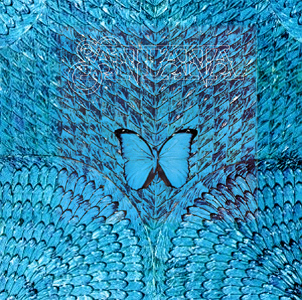
Borboletta is the sixth studio album by the American Latin rock band Santana. It is one of their jazz-funk-fusion oriented albums, along with Caravanserai (1972), and Welcome (1973). Non-band albums by Carlos Santana in this style also include Love Devotion Surrender (1973) with John McLaughlin and Illuminations (1974) with Alice Coltrane, Jack DeJohnette and Jules Broussard. The guitarist leaves much room to percussion, saxophone and keyboards to set moods, as well as lengthy solos by himself and vocals. The record was released in a metallic blue sleeve displaying a butterfly, an allusion to the album Butterfly Dreams (1973) by Brazilian musician Flora Purim and her husband Airto Moreira, whose contributions deeply influenced the sound of Borboletta. In Portuguese, borboleta means "butterfly".
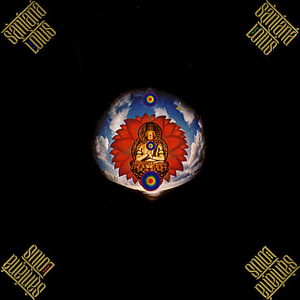
Lotus is a 1974 live album by the Latin rock band Santana, recorded at the Osaka Kōsei Nenkin Kaikan, Osaka, Japan in July 1973, during their Caravanserai Tour. The Welcome album recording sessions were completed shortly before this concert, and that album was later released in November. Lotus was originally released in 1974 as a triple vinyl LP in Japan only. This version of the album was later released internationally.

Amigos is the seventh studio album by Santana released in 1976. It generated a minor U.S. hit single in "Let It Shine" and was the band's first album to hit the top ten on the Billboard charts since Caravanserai in 1972. In Europe, the song "Europa" was released as a single and became a top ten hit in several countries.

Oneness: Silver Dreams - Golden Reality is a 1979 album by Carlos Santana. It was his second of three solo albums to be released under his temporary Sanskrit name Devadip Carlos Santana, given to him by Sri Chinmoy. The album, which consists mostly of instrumental songs and ballads, features members of the band Santana, as well as Carlos Santana's first wife Deborah and father-in-law Saunders King. According to Santana, Oneness was influenced by Weather Report's album Mysterious Traveller. The track "Transformation Day" is an adaptation of part of Alan Hovhaness's symphonic work Mysterious Mountain.

The Swing of Delight is a 1980 double album by Carlos Santana. It was released under his temporary Sanskrit name Devadip Carlos Santana, given to him by Sri Chinmoy. It peaked at #65 on the charts.

Armando Peraza was a Latin jazz percussionist and a member of the rock band Santana. Peraza played congas, bongos, and timbales.
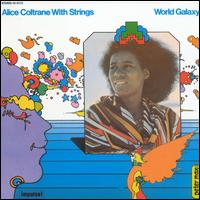
World Galaxy is the sixth solo album by Alice Coltrane. It was recorded in November 1971 in New York City, and was released in 1972 by Impulse! Records. On the album, Coltrane appears on piano, organ, harp, tamboura, and percussion, and is joined by saxophonist Frank Lowe, bassist Reggie Workman, drummer Ben Riley, timpanist Elayne Jones, and a string ensemble led by David Sackson. Violinist Leroy Jenkins also appears on soloist on one track, and Swami Satchidananda provides narration. World Galaxy features a trilogy of original compositions bookended by "My Favorite Things" and "A Love Supreme", two pieces for which her husband John Coltrane was known. It was the second in a series of three albums on which Coltrane appeared with an ensemble of strings.

Eternity is an album by Alice Coltrane. It was recorded in August through October, 1975, and was released in 1976 by Warner Records, her first release with the label. On the album, Coltrane is joined by ensembles of varying size. It was Coltrane's first album following both her move to California and her decision to become a monastic.

Live at Montreux Jazz Festival is a live album by guitarist Carlos Santana and saxophonist Wayne Shorter that was released in 2005. The album is a record of their performance at the Montreux Jazz Festival on July 14, 1988.

Electric Guitarist is the fourth solo album by guitarist John McLaughlin, released in 1978 through Columbia Records originally on vinyl; a remastered CD was issued in 1990 as part of the Columbia Jazz Contemporary Masters series. Among McLaughlin’s former collaborators appearing on the album are drummers Tony Williams, Jack DeJohnette and Billy Cobham, keyboardist Chick Corea, alto saxophonist David Sanborn, violinist Jerry Goodman, bassists Jack Bruce, Stanley Clarke and Fernando Saunders and fellow guitarist Carlos Santana.
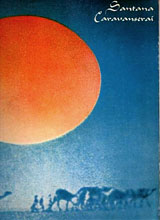
The Caravanserai Tour was a series of performances by American Latin rock band Santana in support of their album Caravanserai during 1972 and 1973. It started on September 4, 1972, at the Erie Canal Soda Pop Festival in Griffin, Indiana, and ended on October 21, 1973 at Ginasio Municipal Novo in Brasília, Brazil. This tour could be considered to be the group's most eclectic tour at this point, as the band did concerts at every continent except Africa and Antarctica, including one of the first, if not the first, tours of Latin America by a major American rock act.

The Welcome Tour was a concert tour by Santana promoting their album, Welcome. The tour began on November 13, 1973 at Colston Hall in Bristol, England and ended on October 29, 1974 at the William P. Cole, Jr. Student Activities Building in College Park, Maryland.
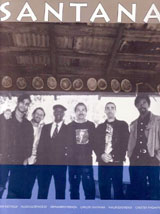
The Spirits Dancing in the Flesh Tour was the twenty-fourth concert tour by Santana in 1990, supporting the Spirits Dancing in the Flesh album.

Turiya Sings is an album by Alice Coltrane, recorded in 1981 during a marathon fifteen-hour session, and initially released in 1982 on privately-pressed cassette for her Vedantic Center's students. The album features recordings of devotional Sanskrit songs sung by Coltrane, accompanied by overdubbed strings and synthesised instrumentation, and marks her first recorded appearance as a vocalist.




















